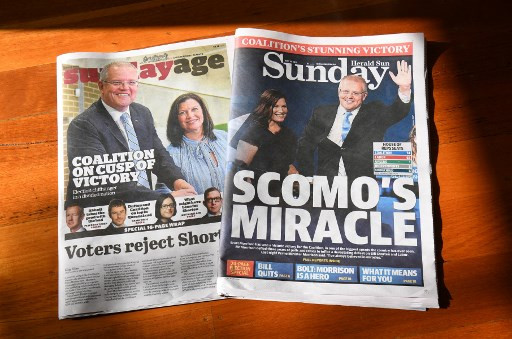Fear of change: Negative politics wins Australia election
"I think we're in an age where it is very difficult to communicate big ideas and to sell imagery," an analyst said.
Change Size
 This photo illustration taken on May 19, 2019 show Sunday newspapers in Melbourne displaying the victory of Australia's coalition government after they clung to power in a general election they were expected to lose. Australia's ruling conservative coalition defied expectations to retain power in national elections on May 18, prompting Prime Minister Scott Morrison to declare: (AFP/William West)
This photo illustration taken on May 19, 2019 show Sunday newspapers in Melbourne displaying the victory of Australia's coalition government after they clung to power in a general election they were expected to lose. Australia's ruling conservative coalition defied expectations to retain power in national elections on May 18, prompting Prime Minister Scott Morrison to declare: (AFP/William West)
A
ustralia's conservative government held on to power at national elections thanks to a highly effective negative campaign warning voters against the center-left Labor Party's large policy reform agenda, analysts said Sunday.
Labor led every opinion poll in the two years prior to Saturday's election but fell well short of a parliamentary majority after the vote, in a surprise result for the ruling Liberal-National coalition.
Analysts said opposition leader Bill Shorten's unpopularity with voters and his struggle to explain the party's complex tax policies were used by Prime Minister Scott Morrison to devastating effect.
Labor's failure also reflected a broader trend across Western societies of voter cynicism towards bold policy platforms, said Australian National University senior fellow Mark Kenny.
"I think we're in an age where it is very difficult to communicate big ideas and to sell imagery," Kenny told AFP, adding that right-wing populists around the world had been successful in invoking nostalgia and anxiety over the future to win elections.
"It's quite hard to run a change or proposed change and to inspire the imaginations of voters and hold that against a very spirited and surgical scare campaign."
Morrison successfully cast Labor's proposals -- particularly on removing tax concessions and tackling climate change -- as too risky and damaging to household finances at a time when the national economy was slowing down.
"He fought an absolutely masterful negative campaign against Shorten and Labor," La Trobe University fellow Tony Walker told AFP.
The government's anti-Shorten slogans focused on hip pocket issues, such as "The Bill Australia Can't Afford", which appeared to have resonated with voters while Labor failed to make the case for change.
Battleground state
Morrison's campaign was particularly effective in Queensland, a battleground state that swung in favour of the government and where Labor's perceived urban bias rankled with regional and rural voters.
Voters in the state's mining towns, already angry with delays in the approval of a major India-backed coal mine promising thousands of jobs, did not warm to Labor's big climate action plans and lukewarm commitment to the project.
"It seemed there was... sometimes mixed messaging about how much they supported it and I think that's come home to roost," University of Queensland politics expert Chris Salisbury told AFP.
"The regions in Queensland are desperate for economic and employment opportunities and (voters believed) that the coalition was better placed to secure those opportunities."
Labor blamed its Queensland collapse on mining magnate Clive Palmer's estimated Au$60 million ($41 million) spend on election advertising.
While Palmer himself failed to secure an upper house Senate seat, support for his party and the anti-immigration One Nation boosted the government's vote thanks to Australia's complex preferential voting system.
Unlike Labor, the coalition campaigned on almost no new policies. Analysts say the fallout from the shock outcome could lead future political campaigns to shun bold or big ideas.
"It'll be damaging if parties can only operate in a safe zone that they think isn't going to offend the electorate," Salisbury said.









